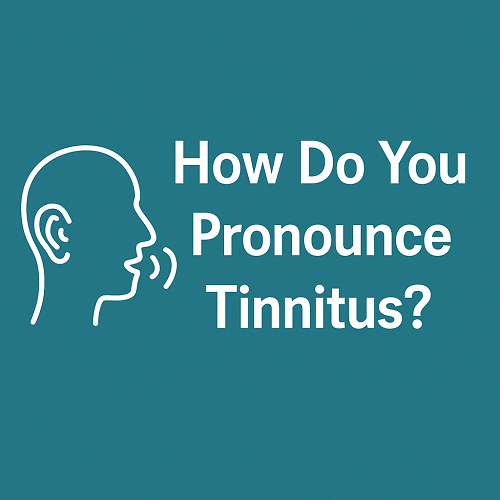Wondering how to pronounce tinnitus? You’re not alone. It’s one of the most commonly mispronounced medical terms — even healthcare providers often get it wrong. In this quick guide, you’ll discover the correct way to pronounce tinnitus, clear up the confusion, and understand what it really means for your ear health.
🗣️ How Do You Pronounce Tinnitus?

Let’s begin with the basics. The word tinnitus is most commonly pronounced as:
- TIN-uh-tus (rhymes with “sinus”)
Some people also say ti-NIGHT-us, but medical experts rarely use that version.
👉 Audiologists and the VA generally prefer TIN-uh-tus in the U.S.
So, when you talk to your doctor, you’ll know exactly how to say it with confidence.
According to the American Tinnitus Association, over 25 million Americans experience some form of tinnitus.
📖 What Does “Tinnitus” Mean and How to Pronounce It??
Now that you can say it properly, let’s talk about what tinnitus actually means.
Tinnitus refers to hearing a sound when there’s no external source. Most often, people describe it as:
- Ringing
- Buzzing
- Hissing
- Clicking
It may occur in one or both ears. In some cases, it goes away. However, long-term cases often interfere with daily life.
👴 Why Tinnitus Affects Many Over 50
After age 50, the risk of tinnitus increases significantly. That’s because:
- Hearing naturally declines
- Noise damage builds up over time
- Many veterans report ear damage
- Some medications trigger ringing
Because of these factors, many older adults find that tinnitus becomes part of their daily routine — and they often look for ways to reduce the discomfort.
Veterans can check the official VA eligibility page to learn more about tinnitus compensation.
🌿 Want Natural Support for Tinnitus Relief?
Of course, learning the correct pronunciation is helpful — but dealing with the symptoms matters more.
That’s why many people explore natural alternatives for support. One trusted option is Quietum Plus.
✅ This herbal formula helps support hearing and nerve health.
✅ It’s made in the USA and works well for people aged 50+.
✅ Users often report better focus and less ringing.
The Mayo Clinic explains tinnitus as the perception of noise when no external sound is present.
👉 Explore our full Quietum Plus Review 2025
❓ FAQs About Tinnitus
Q: Is tinnitus a disease?
No — it’s a symptom, often related to hearing loss or nerve irritation.
Q: Can tinnitus go away naturally?
Yes, sometimes. For example, if it’s caused by earwax or temporary exposure to loud sound, it might fade. However, chronic tinnitus usually needs long-term care.
Q: Does pronunciation matter?
Both versions are fine, but TIN-uh-tus is medically preferred in the U.S.
✅ Final Thoughts
In short, whether you say TIN-uh-tus or ti-NIGHT-us, understanding the condition is what really counts. Now that you know how to pronounce tinnitus correctly, consider learning how to manage it naturally and effectively.
👉 Ready to take control of your ear health? Read our Quietum Plus Review
